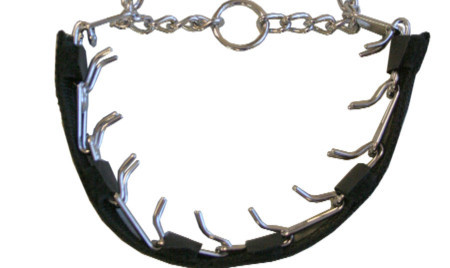
Calls to ban training lead that hurts dogs that wear them.
Animal welfare campaigners are leading a crusade to ban prong dog collars from sale in the UK.
The collars, featuring inward facing prongs which dig into the dog when it pulls on the lead, are used as a way of training pets to walk on a lead.
But charities including the RSPCA, are calling for the collars to be banned, claiming they can cause significant injury to the dogs and spark dangerous behavioural problems.
Lisa Guiney, a dog adoption officer with charity Mayhew Animal Home, has helped numerous dogs that have been subjected to the ‘cruel’ treatment.
She said: “It is usually bruising around the neck or swelling, but sometimes it can pierce the skin.
“The main concern is behavioural. Dogs learn by association and when they are wearing them the reason they walk properly is because they feel the pain.
“They can then associate what they have seen with the pain, so they could associate children or other dogs as the cause.”
An e-petition has now been launched calling on the Government to ban the collars in the UK which has already attracted 10,000 signatures.
A spokesman for charity Dogs Trust said: “We believe there is never a need for prong collars to be used on any dog and these barbaric devices should be banned.
“In the absence of any immediate action by Government to introduce a ban we would encourage supporters to contact retailers selling prong collars to request they stop stocking.”
The RSPCA has also backed the petition.
A spokesman said: “We want to see these collars banned not only because of the risks they pose to dog welfare, but because they have great potential to cause abuse or to be misused. There are much better and more humane ways to train dogs.
“Along with other aversive training techniques, prong collars may also worsen the behavioural problems they aim to address and potentially place owners at considerable risk. A number of studies have found an association between the use of aversive training techniques and the occurrence of undesired behaviour in dogs.”
To sign the e-petition, visit http://epetitions.direct.gov.uk/petitions/58850.

Enjoy the convenience of having The Sunday Post delivered as a digital ePaper straight to your smartphone, tablet or computer.
Subscribe for only £5.49 a month and enjoy all the benefits of the printed paper as a digital replica.
Subscribe